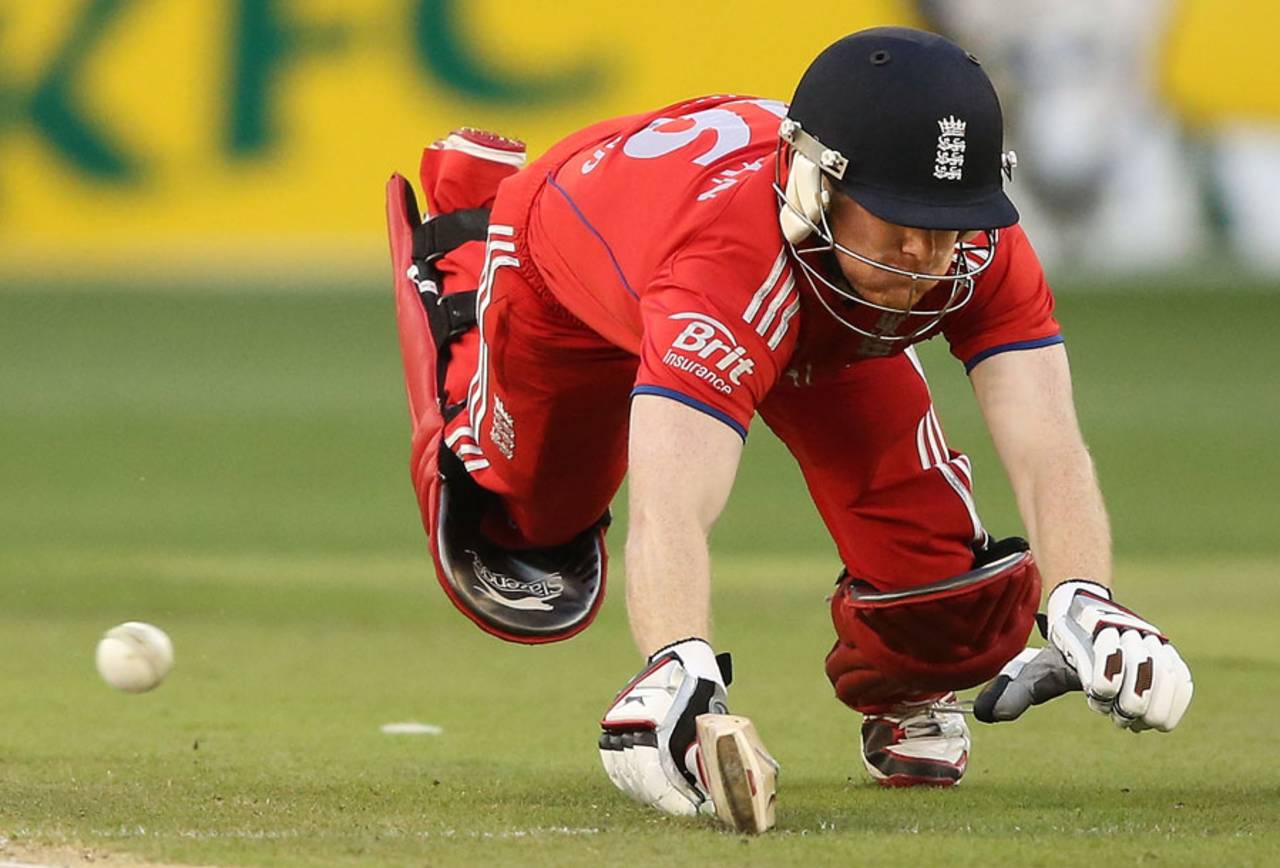England and the IPL: a thaw will come
It's clear now that T20 cricket will not exist in isolation from the rest of the game, and the sooner the ECB realises it, the better
Jon Hotten
May 14, 2014, 5:26 AM

Players like Eoin Morgan, who have experienced big-time franchise cricket, are now more naturally accepting of risk • Getty Images
Given the imminent referendum on independence, there are plenty of Englishmen schmoozing the Scottish nation at the moment. Few have done a better job than Alastair Cook's one-day team, who last week emerged from their first Moores II fixture in credit. They did everything right: splashing across the sodden outfield with a smile, making sure that the crowd saw some cricket and easing to an expected but needed win in the kind of truncated, chaotic game that they have often specialised in losing.
An era of glasnost has been declared. There will be, we're assured, a new openness around the team, an atmosphere that reflects the pride and joy that comes from representing your country. Fans and media are the declared beneficiaries.
There remains one distant border where this fuzzy light will not shine, however, and that is the IPL. If the hand of friendship is being extended there, it's being extended on the quiet, far from public view. A cold-war chill persists publicly, perhaps hardened by the presence of the establishment's own Voldemort, Kevin Pietersen, in Delhi. One of the many irks that led to his estrangement was his ardent advocacy of the tournament.
That was attributed to money, and only a fool would deny its role, yet Pietersen's sharpened cricketing instincts also recognised other values: the chance to deliver under pressure in front of hysterical crowds; the opportunities it provided as a learning experience and an information exchange; the way it was driving the patterns and techniques of the sport forwards. To be isolated from the less attractive elements of IPL cricket was also to be isolated from its benefits. The other day Chris Gayle tweeted news of a dinner he'd had with Pietersen, Virat Kohli and Yuvraj Singh. Maybe they didn't speak about cricket at all, but maybe they did too, and imagine what a conversation that would have been.
It's clear now that T20 cricket will not exist in isolation from the rest of the game. Rather, its attitudes and concepts are feeding into wider thinking about the way international cricket is played. The career of David Warner will prefigure many more. It is hard, for example, to see Darren Lehmann dismissing the notion of Glenn Maxwell as a Test match cricketer. This future is arriving quickly, too. AB de Villiers and Kohli embody the ideal: batsmen rounded in every discipline, able to ratchet up and down to the demands of format.
And where do England stand as it happens? They appear trapped between old and new. Moores' first one-day squad was deeply traditional, a team equipped to win in England but almost nowhere else. It was a strategy with some merit for last year's Champions Trophy, but the next World Cup is in Australia, where the emphasis will be on power and risk. The team that wins will certainly be unafraid to lose: chance is inherent in pursuit of fast starts and big totals.
It's more than just a mindset too. Players like Aaron Finch and Warner and Maxwell, Kohli and Dhoni and de Villiers have evolved a mentality that places a new and different value on their wicket. Their acceptance of risk has become a natural thing.
These subtle shifts have yet to fully infiltrate English thinking, although they are visible in players like Alex Hales and Craig Kieswetter and Eoin Morgan, who have had experience of big-time franchise cricket. They sense the pulse of the modern game.
England are unfortunate in being the only nation whose domestic and international calendar is impacted upon by the IPL. The problem has seemed intractable, but another force will soon be applied. At the moment the IPL is the only free-to-air cricket on television in the UK, thanks to the foresight of Lalit Modi (who also, let's not forget, put the tournament on Youtube). It has built a slightly different audience, albeit not a huge one here. That is to change from next year, when the tournament has been sold to BSkyB, which is the ECB's rights holder, and as such, the board's paymasters. Perhaps Sky will want to see some English stars getting screen time in those full and screaming stadiums. If so, a rapprochement may not be as distant as it currently seems.
If England want a genuine coming together, an actual new era rather than a philosophical one, then an acceptance of the benefits of the IPL should be a part of it. In reality, it is an acceptance of the rest of the world, of the speed at which it moves and the truth that it cannot be controlled, only embraced.